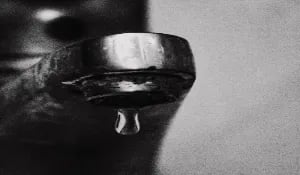3 min read
How Much Water Does It Take To Cause Water Damage?
![]() David Schwartz
Sep 18, 2023 6:09:43 PM
David Schwartz
Sep 18, 2023 6:09:43 PM

Whether you are dealing with a leaking pipe or a full-on flooding situation, your property can sustain significant water damage. Sadly, it doesn't take much water or time to create challenging issues like mold and structural damage.
While some water issues can seem benign and may not raise any red flags for inexperienced landlords - hopefully, you know better. Seemingly small leaks or sitting water can be a nuisance to fix, and repairs may be put off for a better time. But water damage can be insidious.
Here, we'll discuss how your property may incur water damage, how much water it takes to cause damage and provide a brief timeline of how it spreads.
Related: Property Owners: Identify and Fix Water Leaks Once and For All
What is Water Damage?
Water damage is any ruin occurring to your property as a result of water being where it should not be. A lot or a little water can cause significant harm to your property. Here are four of the biggest dangers of water damage:
Mold
In addition to being an eyesore that lowers the overall visual appeal of your property, mold and mildew can present health concerns for your tenants. Mold can develop in moist conditions, spread quickly, and release spores that harm the health of your tenants.
- Respiratory Infections and Illnesses
- Allergies
- Headaches
- Skin Irritations
More than being a danger to your tenants, unchecked mold growth can render your property unfit for occupancy.
Structural Damage
It may be hard to believe, but water damage can eventually ruin your property. Swollen wood floors, damp and discolored walls, crumbling roofs and ceilings, and cracked foundations can all occur because of water damage that isn't addressed immediately.
Electrical Problems
Water in the wrong places can cause extensive damage to your property's electrical wiring. Short circuits that ruin appliances, shocks, power outages, or even electrical fires can all result from water damage.
Pest Infestations
The moisture that water damage leaves behind can become attractive to rodents and insects. Your once pristine property can become infested with pests that cause additional damage.
Related: 5 Top Reasons Why Landlords Should Invest in Water Conservation Measures
Are you a landlord? See how much you can save on water expenses with The Water Scrooge.
What Causes Water Damage?
Understanding the possible devastation of water damage, here are a few ways it can occur.
Leaks
Leaks can happen for many reasons. Your property may have broken seals on windows or doors, a damaged roof, blocked gutters, or faulty plumbing fixtures. While some leaks can be prevented with regular maintenance, some leaks are hidden and can cause damage before you or your tenants are even aware of them. Undetected leaks give water time to seep into many areas unnoticed.
Flooding
Natural disasters like flooding can cause water damage to your home. Even an inch of water sitting on your property is enough, but of course, the more water present and the longer it's left, the worse the situation. Malfunctioning appliances like dishwashers, air conditioners, and washing machines can also cause flooding in the dwelling. Flooding from sewage backups or excessive rainfall can present additional dangers as well.
Humidity
High humidity can also cause water damage due to the excess moisture and condensation. Mold can grow in consistent humidity, and paint on the walls and ceilings can peel or bubble. So don't ignore high humidity.
How Much Water Does It Take to Cause Damage?
Unfortunately, even a small amount of water can cause significant and extensive damage to your property. This happens when it is left to seep into the structure of your building and begins a chain reaction of damage. All potential dangers cannot be anticipated or avoided, but the next best thing you can do is to fix the issues immediately and begin efforts to reverse the damage.
Water Damage: The Timeline
Following is a basic timeline of how water damage progresses from the first leak.
- The First 6 to 8 hours: The water is absorbed by porous items like furniture, wood, and walls. The damage is minor at this point and can be easily remedied and reversed. If this is black water, additional steps must be taken to ensure health and safety criteria are met.
- The First 24 hours: If the leak wasn't detected before, it should be apparent now. In 24 hours, water can cause visual damage to walls, ceilings, etc., although the actual long-term effects may still be minimal. Do everything you can to stop the water and manually dry any sitting water.
- 24 to 72 Hours: The damage is approaching a critical point by this time. Mold has already begun to grow, and you may notice an odor. This means your tenants may have health concerns with coughing, respiratory difficulties, or allergies.
- After 3 Days: A considerable amount of water has been leaked by now, and the above issues will be made much worse. The damage is no longer minimal, and restoring the property to its former glory will be costly. But you should still act with urgency to stop the leak and dry everything affected.
- After 7 Days: By now, the property is riddled with mold, the smell is pungent, and if your tenants are still in the property, they may be falling ill. The prevalence of mold, mildew, and other bacteria has made this an unhealthy place to be. Some of the ruin is irreversible by now, and the clean-up should be left to professionals.
Related: The 8 Best Water-Saving Products for Multifamily Buildings
Protect Your Property From Water Damage
Water damage can be a nightmare for landlords. It doesn't take much water to create a situation that dramatically lowers the value of your property. Fortunately, most damage can be anticipated and avoided with regular building maintenance. But leaks, floods, or other mishaps that can't be avoided should be dealt with immediately.
Are you a landlord looking to conserve water? Visit us to see how you can save water and enhance the value of your property with The Water Scrooge.

